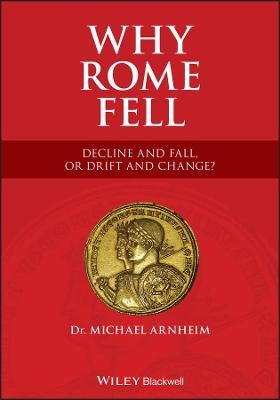
Why Rome Fell
Wiley-Blackwell (Verlag)
978-1-119-69137-2 (ISBN)
In Why Rome Fell: Decline and Fall, or Drift and Change?, celebrated scholar of Roman history Dr. Michael Arnheim delivers a fascinating and robust exploration of the causes of and reasons for Rome’s fall in the West. Steeped in applications of elite theory to the later Roman Empire, the author discusses several interconnected issues that influenced the decline of Rome, including monarchy, power structure, social mobility, religion, and the aristocratic ethos.
Incisive comparisons of the situation in Rome to those in the Principate and the Byzantine Empire shed light on the relative lack of “indissoluble union and easy obedience” (in Gibbon’s phrase) in the later Roman Empire. Instead, the book reveals the divided loyalties of a fractured society that characterized Rome in its later years. Why Rome Fell also includes:
A thorough introduction to the transition from the ancient to the medieval world, including discussions of monarchy, Diocletian and his relationship to the aristocracy, and Constantine’s reforms
Comprehensive explorations of the rise of the Roman Christian empire and Constantine’s role
Practical discussions of conflicting theories of what caused the fall of the Roman empire, including the Pirenne thesis, the malaria hypothesis, Gibbon’s ‘decline and fall’ theory, and the role played by religion
An indispensable resource for students, scholars and the general reader with an inquiring mind about history, Why Rome Fell deserves a place on the bookshelves of anyone with an interest in a sophisticated and original take on historical continuity and change.
Dr. Michael Arnheim is a Sometime Fellow of St. John’s College, Cambridge, and a practicing London Barrister. After he was awarded his Ph.D at 25, his doctoral thesis was published by the Oxford University Press under the title of The Senatorial Aristocracy in the Later Roman Empire—the first of 23 published books to date. At age 31, Arnheim was appointed full Professor and Head of the Department of Classics at his old university in South Africa, subsequently returning to Britain to take the Bar.
About the Author ix
Preface xii
Introduction 1
Part I: Transition From The Ancient To The Medieval World And Beyond 11
1. Rome: From Monarchy to Monarchy 13
2. Diocletian: Hammer of the Aristocracy 60
3. Constantine the Reformer 83
4. The Christian Empire 118
5. Continuity and Change 149
6. Two Models of Government 197
Part II: Conflicting Theories 261
Prologue to Part II 263
7. Varieties of History 273
8. Gibbon’s The Decline and Fall of the Roman Empire 299
9. The Malaria Hypothesis 308
10. The Role of Religion 315
11. The Pirenne Thesis 344
12. “Late Antiquity” 357
13. Assassination or Accommodation? 379
Part III: Envoi 409
14. Conclusion 411
Glossary 433
List of Primary Sources and Abbreviations 435
Select Bibliography 439
Index 452
| Erscheinungsdatum | 11.03.2022 |
|---|---|
| Verlagsort | Hoboken |
| Sprache | englisch |
| Maße | 178 x 252 mm |
| Gewicht | 998 g |
| Themenwelt | Geisteswissenschaften ► Geschichte ► Allgemeine Geschichte |
| ISBN-10 | 1-119-69137-0 / 1119691370 |
| ISBN-13 | 978-1-119-69137-2 / 9781119691372 |
| Zustand | Neuware |
| Haben Sie eine Frage zum Produkt? |
aus dem Bereich


